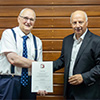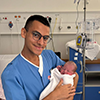“Gender equality is not just a women’s issue. Everyone stands to gain from changing the status quo”, Professor Brenda Murphy, Associate Professor at the Faculty for Social Wellbeing. She explains why discussing gender equality in 2020 is more important than ever.
In view of how, at present, women are still working at less pay, and in less positions of decision-making, she urges everyone to be mindful of how under or misrepresentation of women is, fundamentally, a human rights issue.
Striving for a modern society that always seeks to attain progress, she told the Newspoint team, also means recognising that men and women’s interests should be represented equally and with a fair distribution of power. There is nothing wrong with being labelled a feminist, as the term applies to anyone who wants to live in a society that makes space for all genders in ways that reflect their respective realities and doesn’t prioritise one over the other.
One way to make sure that this is actually being done is by changing the way women are portrayed in the media.
“In order to have strong democracy, where women can participate fully in a society, we need to reflect this in how we portray them in the media”, Professor Murphy strongly believes. At present, the impression one would get when following local media is that the population is 80% male and 20% female (and GMMP data backs up these figures [76:24]). This is because there isn’t such a diverse coverage of topics, and the perspectives through which they are discussed, aren’t as varied as one would want.
For local media to look like real life in general, Prof Murphy listed a number of measures that should be adopted. National media regulatory bodies would need to develop and implement specific policies on gender equality, as well as a national media policy. “We need firm guidelines for all media practitioners, and a proactive media authority, quotas in decision-making media structures and an effort from all media houses to adopt a gender policy and actually put it into practice”, she added.
Another step to take to equal out the ground in representing women would be establishing education bodies to address media literacy and gender equality and embed these programmes into the National Curriculum from Kinder 1 onwards. “Media literacy should be taught to the youngest children upwards”, Professor Murphy said, while reiterating that this should be supported by research to help continued understanding of gender issues in the media.
In 2018, while she was writing the FEMM Committee Report (FEMM is the Committee on Women’s Rights and Gender Equality), she realised she was making the same recommendations she had made in previous advisory documents for the EU.
Frustrated at how no positive tangible change was registered in these reports in 20 years, Professor Murphy decided to do her part by setting up an NGO called Mediating Women. “One of my recommendations had been to have an NGO dedicated to the issues, which would help drive policy, training and research. I realised this was up to me to get on with it”.
And Mediating Women is doing just that, and a bit more. The NGO is presently working with UNESCO to ‘train the trainer’. Together, they will be holding a workshop to help participants to ultimately produce Media and Gender courses. Media educators from across Europe and Africa will come together for 3 days in October, to receive training from a team of Media experts so they can design a Gender and Media course that would work in their own country.
“It’s a beautifully-designed concept and we are very excited about our collaboration with the Department of Gender & Sexualities and the Faculty for Social wellbeing as well as the National Commission for the Promotion of Equality”.
But whilst having a media watchdog such as Mediating Women is an important element, it is only part of the solution. As Professor Murphy recommended in her 2018 FEMM Committee Report, for women to become upwardly mobile in decision-making in local media structures, access to childcare provision and flexible working conditions, active mentoring and training for progression are all sorely needed.
The Global Media Monitoring Project will generate a national report later this year, and Professor Murphy is hoping working cultures are more thoroughly addressed as a result of this report. Taking the newsroom as an example, few women make it to editorial positions because they are either discouraged from pursuing certain hard news leads, which generate the most interest, or because they are expected to be main caregivers and that would deprive them of career progression.
One of the questions to be asked here is, “what is causing women to leave the industry? What can be done to stem the leaky pipe?”.
To help identify this and other things, Mediating Women is compiling a database of subscribers and female panellists. “We know from the GMMP reports that there still isn’t enough female representation on discussion programmes… and I’m not just talking about Malta here. There is, in fact, ongoing activism about this on social media platforms: one example is the Twitter hashtag ‘#manel’, to refer to a discussion panel that is made up primarily of men.”
One thing Professor Murphy is keen on is helping erode the concept of #manels, or events where only males are invited to share their expertise on a certain subject.. “You will find TV programmes where, yet again, another ‘manel’ is discussing a particular issue… any issue, really; including women’s issues such as reproductive rights, legislation on women’s bodies etc.” Mediating Women plans a hashtag campaign here in Malta. “‘Manels’ are still a very-much recognized phenomenon, in the global and local media. So if you are watching a programme and there is a predominantly male panel - screenshot it and send it to us on our Facebook page.”
Mediating Women recognises that some women find it hard to step forward and appear on programmes - they may need more support, training or simple encouragement. In Ireland, there’s a voluntary NGO called ‘Women on Air’, made up of professionals who give their time for free, to train women and give them the skills to enable them to comfortably on air and present their standpoint.
“Ultimately, if we really want to see more women on air we have to change current practices, and Mediating Women plans to work on this. We have already had experts in Public Speaking who have offered their time pro bono - so we are really looking forward to getting started on this. So if anyone is interested, they should follow us on Facebook and watch out for the announcements”.
“Whether its gender-blind headlines, manels, manterruptions or other mechanisms that skew a balanced media – Mediating Women is committed to calling out and raising awareness about shortcomings, challenging outdated practices, whilst offering solutions and support, will bring about a change in mentality. This in turn, will contribute towards a much-needed evolution across the media landscape”, she concluded.



